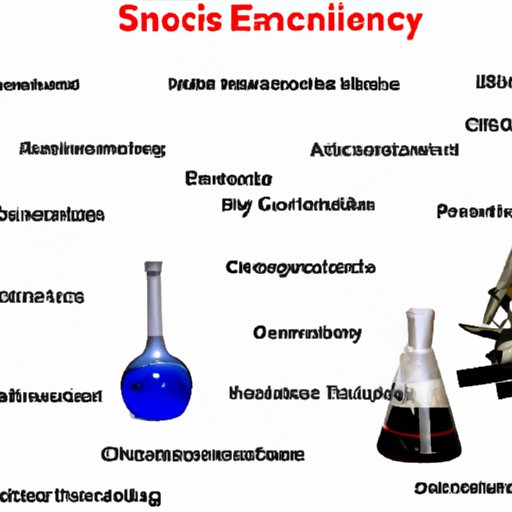Introduction
Science and non-science are two distinct fields of knowledge that can be difficult to differentiate. While both involve the pursuit of knowledge, there are certain criteria that distinguish science from non-science. In this article, we will explore what distinguishes science from non-science, discussing their philosophical differences, core methods of inquiry, use of evidence, theories, relationship, and characteristics.
Analyzing the Philosophical Difference Between Science and Non-Science
In order to understand the difference between science and non-science, it is important to consider the definition of each. According to philosopher Karl Popper, “A scientific statement or theory is testable against the empirical world; it can be refuted by a factual falsification.” This means that science involves the pursuit of knowledge through experimentation and observation, with the aim of producing verifiable results that can be tested against reality. On the other hand, non-science refers to any field of knowledge that does not follow this approach. This includes fields such as philosophy, religion, and art, which do not rely on empirical evidence and instead rely on faith and intuition.
The distinction between science and non-science is often seen as a philosophical one. Science is based on the idea that knowledge can be obtained through careful observation, experimentation, and analysis of data. Non-science, however, relies on faith and intuition rather than empirical evidence. This means that while science seeks to uncover the truth about the natural world, non-science seeks to understand the meaning and purpose of life through faith and personal experience.
Exploring the Core Methods of Scientific Inquiry
In order to understand the difference between science and non-science, it is important to explore the core methods of scientific inquiry. These include observation, experimentation, analysis, and the scientific method. Observation involves carefully observing the natural world in order to draw conclusions about how it works. Experimentation involves conducting experiments in order to test hypotheses and gain further insight into the natural world. Analysis involves analyzing data in order to draw conclusions about the natural world. Finally, the scientific method involves forming a hypothesis and then testing it through experimentation and analysis.
Examining the Role of Evidence in Distinguishing Science from Non-Science
Another key factor in distinguishing science from non-science is the role of evidence. Evidence is an integral part of scientific inquiry, as it helps scientists make informed decisions and draw accurate conclusions. There are two main types of evidence: primary and secondary. Primary evidence is direct evidence that is obtained through observation or experimentation. Secondary evidence is indirect evidence that is obtained through analysis of existing data or literature.
When evaluating evidence, scientists must consider its accuracy and reliability. They must also consider whether the evidence is relevant to the question being asked. By carefully evaluating evidence, scientists can ensure that their conclusions are based on sound reasoning and reliable data. This is an important part of distinguishing science from non-science, as non-science does not rely on evidence but instead relies on faith and intuition.
Comparing the Nature of Theories in Science and Non-Science
Theories are another key factor in distinguishing science from non-science. A theory is a set of interrelated concepts that explain a phenomenon. In science, theories are based on evidence and are constantly tested and refined. They are also open to revision and change as new evidence is discovered. In contrast, non-science theories are based on faith and intuition and are not subject to revision. This means that non-science theories are not always supported by evidence and can be difficult to verify.
Investigating the Relationship Between Science and Non-Science
While science and non-science may appear to be two distinct fields of knowledge, they are actually interdependent. Science relies on non-science for its philosophical foundations, while non-science relies on science for its methodology and empirical evidence. This means that science and non-science are not mutually exclusive but instead form a dynamic relationship. Without non-science, science would lack the philosophical basis for its methods and conclusions. Without science, non-science would lack the empirical evidence needed to support its theories.
Identifying the Characteristics of Science and Non-Science
Finally, it is important to identify the characteristics of science and non-science in order to fully understand the difference between them. Science is characterized by systematic observation, experimentation, and analysis, while non-science is characterized by faith and intuition. Science relies on evidence to support its theories, while non-science relies on faith and intuition. Science is open to revision and change, while non-science is not. Additionally, science is focused on understanding the natural world, while non-science is focused on understanding the meaning and purpose of life.
Conclusion
In conclusion, science and non-science are two distinct fields of knowledge that have certain criteria that distinguish them from one another. Science is based on empirical evidence and relies on observation, experimentation, and analysis to uncover the truth about the natural world. Non-science, on the other hand, relies on faith and intuition and is not subject to revision. The two fields are interdependent, with science relying on non-science for its philosophical foundations and non-science relying on science for its methodology and empirical evidence. Ultimately, by understanding the differences between science and non-science, we can gain a better appreciation for the unique contributions of each.
(Note: Is this article not meeting your expectations? Do you have knowledge or insights to share? Unlock new opportunities and expand your reach by joining our authors team. Click Registration to join us and share your expertise with our readers.)
